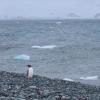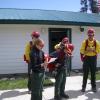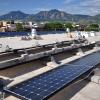Climate & Environment
 In the book “The Wild and the Wicked,” philosophy professor Benjamin Hale argues that because people have the unique capacity to care for the environment, they have a moral obligation to do so.
In the book “The Wild and the Wicked,” philosophy professor Benjamin Hale argues that because people have the unique capacity to care for the environment, they have a moral obligation to do so. Just north of Nederland, about 26 miles from Boulder, is CU Boulder’s Mountain Research Station. It is the university’s highest research facility and is home to some of the world’s longest-running alpine research on everything from how trees respond to increasing wildfires to charismatic little pikas and more.
Just north of Nederland, about 26 miles from Boulder, is CU Boulder’s Mountain Research Station. It is the university’s highest research facility and is home to some of the world’s longest-running alpine research on everything from how trees respond to increasing wildfires to charismatic little pikas and more. As Earth’s atmosphere continues to warm, biodiversity in the global ocean is increasingly at risk. In this Q&A with Cassandra Brooks, we explain the importance of protecting the Southern Ocean in particular as the world races to conserve biodiversity across the globe.
As Earth’s atmosphere continues to warm, biodiversity in the global ocean is increasingly at risk. In this Q&A with Cassandra Brooks, we explain the importance of protecting the Southern Ocean in particular as the world races to conserve biodiversity across the globe. A paper recently submitted to Nature Scientific Reports explores a scenario in which a 100%-electrified fleet of vehicles must attend to both ride requests submitted by customers and charging requests sent by a utility company during a period of high renewable energy generation.
A paper recently submitted to Nature Scientific Reports explores a scenario in which a 100%-electrified fleet of vehicles must attend to both ride requests submitted by customers and charging requests sent by a utility company during a period of high renewable energy generation. For eight summers, Jody Jahn earned money for college working as a wildland firefighter on U.S. Forest Service crews. Now, instead of rappelling out of helicopters to fight fires, she's an associate professor of communication who studies the culture of wildland firefighting crews.
For eight summers, Jody Jahn earned money for college working as a wildland firefighter on U.S. Forest Service crews. Now, instead of rappelling out of helicopters to fight fires, she's an associate professor of communication who studies the culture of wildland firefighting crews. More than half of the lakes around the world are losing water. The Cooperative Institute for Research in Environmental Sciences at CU Boulder reconstructed lake levels from the past 30 years, determining that climate change, human consumption and sedimentation are the reasons for the decline.
More than half of the lakes around the world are losing water. The Cooperative Institute for Research in Environmental Sciences at CU Boulder reconstructed lake levels from the past 30 years, determining that climate change, human consumption and sedimentation are the reasons for the decline. Since the 1990s, Indigenous groups and other communities around the world have increasingly fought for, and secured, collective property rights to the land they live on. New research suggests that these arrangements can have impacts not just on ecosystems like forests but on the psychology of people.
Since the 1990s, Indigenous groups and other communities around the world have increasingly fought for, and secured, collective property rights to the land they live on. New research suggests that these arrangements can have impacts not just on ecosystems like forests but on the psychology of people. Snow is melting earlier, and more rain is falling instead of snow in the mountain ranges of the Western U.S. and Canada, leading to a leaner snowpack that could impact agriculture, wildfire risk and municipal water supplies come summer, according to a new CU Boulder analysis.
Snow is melting earlier, and more rain is falling instead of snow in the mountain ranges of the Western U.S. and Canada, leading to a leaner snowpack that could impact agriculture, wildfire risk and municipal water supplies come summer, according to a new CU Boulder analysis. Black Mirror meets Don’t Look Up in Apple TV’s dystopian drama about living through climate change impacts. Not for the faint of heart, Extrapolations depicts a future with rising temperatures, sea levels and global tensions—all mostly within the realm of possibility, according to CU experts.
Black Mirror meets Don’t Look Up in Apple TV’s dystopian drama about living through climate change impacts. Not for the faint of heart, Extrapolations depicts a future with rising temperatures, sea levels and global tensions—all mostly within the realm of possibility, according to CU experts. The TEAMUP consortium, which brings together researchers from academic, industrial and federal laboratories, seeks to identify and solve the factors that cause advanced perovskite materials to be unstable, paving the way for the integration into existing and future solar cells, boosting the efficiency of harvesting renewable solar energy.
The TEAMUP consortium, which brings together researchers from academic, industrial and federal laboratories, seeks to identify and solve the factors that cause advanced perovskite materials to be unstable, paving the way for the integration into existing and future solar cells, boosting the efficiency of harvesting renewable solar energy.


